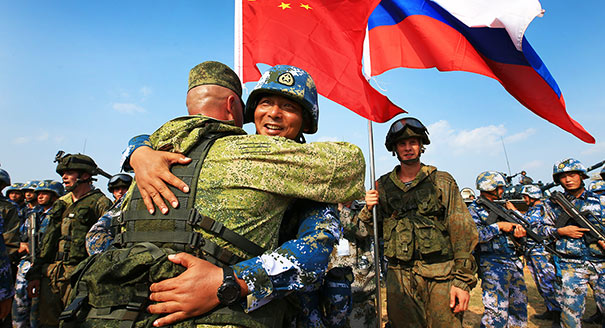The current foreign policy of Russia pressured by Western countries is more and more turning towards China which, for its part, is becoming the biggest challenge for the West. Russia’s message conveyed by its Foreign Minister proves that there is a geopolitical rapprochement between Russian Federation and China.
According to Lavrov, the EU broke off relations with Moscow which has only a few countries left maintaining relations with it. Thereby, the Chinese option has become necessary for Russia.
However, the
Russian-Chinese coalition has an asymmetric balance of powers.
Russia can expect to achieve parity only in the military field and
raw materials. But, when it comes to the issues
of economic development, high technology, and geopolitical growth,
then, of course, Russia enjoys the role of junior partner. Today the
latter is in the situation when it has to resist
pressures.
It has long been clear that Russia on its own is capable of opposing
the West nothing but a military threat and blackmail over the raw
materials. The Putin regime’s claims to the global leadership
cannot be realized without the external support. But, the worst thing
is that the aggravation of the geopolitical confrontation, the
consolidation of global rivals will inevitably affect our country.
The growing
economic vigor of China is likely to reduce the opportunities for the
West to pressure on it.
In
this context, Biden probably realizes that the direct economic
confrontation between the United States and China, which Trump has
attempted, is the wrong strategy.
Therefore,
Biden’s initiative to create the alternative project to the Chinese
“One Belt – One Road” looks like a search for solutions to
strengthen the competitive position of the West and especially the
United States.
The rapprochement
between Russia and China is also reflected in public opinion1.
Russia’s
attitude toward China improved dramatically in 2014, when Russia’s
confrontation with the West intensified.
The
peak of positive attitudes came in 2015, when 80-81% of Russians had
a positive attitude towards China.
Today,
positive attitudes towards China are slightly less: 75%.
Significantly,
most Russians see China as a factor of strengthening Russia’s role
in the world (55%), while 9% have the opposite view.
Others
do not believe that China has influence on Russia’s position.
As
we can see, a fairly clear consensus is being formed around the
pro-Chinese course of Russia.
Thus,
China is becoming a geopolitical alternative not only for the Russian
political elites, but also for the population.
Nowadays, the
West, represented by NATO, is removing off its masks, openly
referring Russia and China as its main threats. Increasing pressure
on Russia will undermine its ability to remain a global player on its
own, so it will provoke its further drift towards China. The process
of forming the geopolitical blocs is definitely a risk factor for the
world security.
As for Ukraine,
in this context, the sensitive issue concerning the subjectivity of
our country in international relations becomes relevant. It would be
naive to hope that one of the great international players is
sincerely concerned by the well-being and peace of the Ukrainian
people. It seems more believable that Ukraine is a specific
“go-between” in the relations between the West and the East, and
the contradictions of these relations are not reflected on our
country in the best way.
